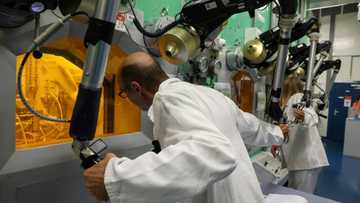Schneider Electric Reveals How Multinationals Can Drive growth, Skills Transfer in Africa
- Multinationals have a significant role to play in harnessing the full potential of the African data centre market
- An international electric and data company, Schneider Electric, says it is deploying data across Africa to teach firms how to leverage tech
- The company stated that the African continent is virile with its young population to drive data
PAY ATTENTION: #StartupSouth Awards 2023 Nominated Legit.ng in the category Best Startup Coverage! Your support matters - click to VOTE for Legit.ng for free!
The outlook for data centre growth on the African continent looks bullish. With a population of almost 1.5 billion people, the African marketplace possesses a significant market size and potential advantage.
Notably, while the continent might need to catch up to countries like China and India regarding sheer population size, what sets it apart is the average age of its population, which is between 18-19 years. It is a young generation that is well-equipped to adapt to the digital environment’s continuous change.

Source: Getty Images
African youths to drive tech development
This younger generation has a natural affinity for learning and working with technologies such as AI. This demographic advantage will fast-track Africa’s strengthening role in the global data centre marketplace.
PAY ATTENTION: Share your outstanding story with our editors! Please reach us through info@corp.legit.ng!
Another important differentiator is the continent’s geographical location. Positioned almost centrally on Earth, it offers significant advantages in terms of connectivity and accessibility. Cities like Mombasa in Kenya are incredibly well located on sub-sea fibre links, offering a gateway to Asia that contributes to processing large amounts of data traffic.
Multinationals step into the limelight
Multinationals have a significant role to play in harnessing the full potential of the African data centre market. Bridging the data centre skills gap is an important step. Increasingly, multinational companies are hiring local engineers, providing valuable expertise and experience while exposing them to the global market.

Read also
Rising stars: Nigerian youths driving change in society, Olusegun Obasanjo visited one of them
According to reports, At Schneider Electric, for example, teams from regions such as Anglophone and Francophone Africa have continuous access to knowledge and developments from their peers worldwide. This is incredibly valuable as it allows these teams to stay on par with their global counterparts.
Importantly, it bridges the talent gap and brings the requisite skills that contribute to the ongoing growth of the African data centre marketplace.
Another essential data centre growth enabler is infrastructure development. Multinationals contribute to various aspects of infrastructure development, including grid stability, efficient water management, and the introduction of advanced technologies.
Investment in data centres to provide incentives for employment
In turn, these investments deliver advancements in cooling systems, electrical equipment, and the promotion of renewable energy sources. Simply put, these developments and ongoing multinational investment significantly benefit the continent.
When discussing multinationals’ role in the African data centre market, it would be remiss not to mention sustainability. These organizations have a significant role in ensuring local data centre markets align with international environmental sustainability principles.
This includes implementing energy-efficient infrastructure that utilizes renewable energy sources, optimizes cooling systems to minimize energy consumption, and effectively manages and tracks water consumption.
Schneider Electric reports expose sustainability action gap
Legit.ng reported that reports and studies commissioned by leading digital energy transformation management and automation firm Schneider Electric have revealed a disconnect between global intent and action on sustainability in information technology and data centre operations.
The three studies, conducted separately by industry-leading analysts at 451 Research (a part of S&P Global Market Intelligence), Forrester Consulting and Canalys, saw the collection of data from nearly 3,000 global participants, including the largest colocation and cloud providers, IT solution providers, and IT professionals across many segments and organisation sizes.
According to the 451 Research paper, enterprise organisations have a perception-versus-reality problem because their sustainability programs are perceived as being more advanced than they are because "the maturity evaluations of nearly half (48%) of respondents did not match a previous answer."
Source: Legit.ng




